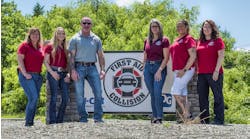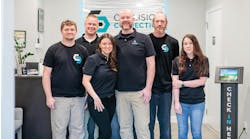Brothers keep up on latest technology, I-CAR training and fight to keep vo-tech schools open Also Read: Cleaning
up, Going from crash to clean
SnapshopLocations: Three shops and a wrecker service. Simpson’s Body Shop in Sheffield, Ala.; Simpson’s Collision Repair in Florence, Ala.; and Simpson’s Custom Body Shop in Killen, Ala. Founded: The shop was opened in Sheffield in 1980. The family had a wrecker service since 1970 as well as a glass company, which was incorporated into the autobody repair facilities. Annual gross
income: About $5 million (about $1.8 million each for the Florence and Sheffield location, $1.2 million for the Killen location.) The towing service grosses about $550,000.Volume/Production: 250 vehicles per month for all three shops.
Ownership: Simpson Enterprises is owned by Gary Simpson and is a family-run business. His three sons run the body shops. Danny Simpson runs the Sheffield location; Johnny Simpson runs the Florence, Ala., location; and Mark Simpson runs the Killen, Ala., location. When the question, “How should I handle this procedure?” comes up at any of the three Simpson brothers’ body shops, the answer is always the same: “Do it the only way there is to do it—the right way.” Mark Simpson, one of the three vice presidents for Simpson’s and shop manager of Simpson’s Custom Body Shop in Killen, Ala., says this is always his answer. Mark, whose shop is the only one of the three Simpson repair facilities—and only one in the three shops’ area—that is an ASE Blue Seal shop, says, “It’s important to stay up to date with the industry. It’s important for the customer to feel that your people know what they are doing.” This aspiration to stay on top of the industry goes beyond this, too. Not only have the Simpsons made sure their techs stay current in their training, but they have made it their mission to ensure that training is available to future techs. When Mark found out that his alma mater, Muscle Shoals Center for Technology, was on the verge of shutting its doors permanently, he became heavily involved with the school. A carpentry teacher at the school called him and told him it was shutting down. “They had already practically closed the whole school down,” Mark says. When Mark attended Muscle Shoals Center for Technology, there were programs in carpentry, welding, mechanics, autobody, horticulture, masonry and others. But when Mark found out about the school’s troubles, the autobody program was nearly shut down, and all the other hands-on programs except carpentry had been disbanded. “As teachers were retiring, they were closing down programs,” he says. Some were replaced with computer-based classes, but otherwise, the programs were defunct. “I was floored,” Mark says, adding that he is particularly concerned about the survival of vo-tech programs because they’re what made him who he is today. “There are so many students that aren’t college bound, and the industry is really looking hard for good techs,” Mark says. From just working in the industry, he estimates that for every one person that enters into the collision repair industry, about four leave it. “People are leaving it faster than they are coming,” Mark says, adding that it’s particularly unsettling. “I wasn’t college-bound material. There is a place for everybody. Just because I don’t make straight A’s in algebra, English or history doesn’t mean I’m not a smart person.”Mark knew he had to do something, so he went before the school board and made a plea to keep the autobody repair program open. He went to body shops and car dealerships to garner support. Mark wound up on the front page of some local newspapers for this effort, and the school board kept the autobody repair program open.“Kids need [the program],” he says. “It doesn’t matter what they do to the schools. There are still going to be kids…who are going to want to work with their hands.” Mark and his brothers continue to stay involved with vo-tech programs. Just like fixing a vehicle in one of their shops, there is only one way—the right way. Although Mark says, “We’re not God, we make mistakes,” Mark says he and his brothers keep this mantra in mind no matter what—whether it’s the education of future techs or their own customers. “We stand behind what we do, and we try to resolve any issues or problems with customers immediately,” Mark says. But to ensure that it’s “done right the first time,” all of the Simpson collision repair facilities worked to become I-CAR Gold Class bodyshops. “We’re the only ones in the quad-cities area with this status,” says Danny Simpson, Mark’s brother and vice president and shop manager for Simpson’s Collision Repair in Sheffield, Ala. “There aren’t any other I-CAR Gold Class Shops within 75 miles—there’s nothing else on this side of Huntsville, Ala.” Danny says although he and his brothers spent a lot of time and money on I-CAR training, it’s worth it—even if the customers often are not aware of its value. “The customers are more interested in how fast you can fix a car than what I-CAR is,” Danny says. But the Simpson brothers are working on changing that. Danny says brochures explaining about I-CAR and its pertinence are available at their locations. Whether customers truly understand what bringing their vehicle to a shop with techs trained in this type of program means, the Simpsons say they will continue to stay with he program. “It shows our desire to stay on top of things,” Danny says. “It shows we care about the industry.” CLEANING UPGoing from crash to clean
When cleaning or organizing, it oftentimes seems as if it’s necessary to make a mess before something will be thoroughly clean. Whether it’s pulling all the tools out of your toolbox and laying them on the ground before putting them back in an organized manner or taking everything out of a closet and sifting through it before you clean it up, the mess seems to come before the cleanliness. The customers of Simpson Enterprises’ three body shops—Simpson’s Body Shop, Simpson’s Collision Repair and Simpson’s Custom Body Shop—feel that way about their cars. Before customers pick up their vehicles from one of these collision repair facilities, the shops’ techs fully detail it both inside and out. This includes cleaning floor mats and entire inside, vacuuming it, washing the outside and washing under the hood. “We ultra-fine sand and buff the car because it produces a higher-quality finish, whereas many other shops do not,” says Danny Simpson, shop manager and vice president of the Florence, Ala., Simpson’s location. “Our customers tell us that they will have to wreck their car just to get it cleaned up again,” Danny says. When a few repeat customers came back, they joked with him that they merely wrecked it again so they could get it thoroughly cleaned.
It’s these little perks that leave an impression on customers. Danny says the vehicles get pretty dirty while they’re in the shop, so they need to be cleaned up anyway. “But people just don’t realize it,” Danny says. “When they say, ‘You didn’t have to clean it up,’ you just ride the glory on it.” Some customers also come in with pretty grubby vehicles, and when they get it back clean it impresses them. Although it costs about an additional $25 per car to clean it up—without reimbursement—customers really appreciate it, Danny says. “You’d be surprised,” he says. “Some people bring in their cars and they are filthy and nasty. It’s like a garbage can.” Although cleaning it up has nothing to do with the work performed, he says, “It gives them a feeling of us caring about our customers.”
Ownership: Simpson Enterprises is owned by Gary Simpson and is a family-run business. His three sons run the body shops. Danny Simpson runs the Sheffield location; Johnny Simpson runs the Florence, Ala., location; and Mark Simpson runs the Killen, Ala., location. When the question, “How should I handle this procedure?” comes up at any of the three Simpson brothers’ body shops, the answer is always the same: “Do it the only way there is to do it—the right way.” Mark Simpson, one of the three vice presidents for Simpson’s and shop manager of Simpson’s Custom Body Shop in Killen, Ala., says this is always his answer. Mark, whose shop is the only one of the three Simpson repair facilities—and only one in the three shops’ area—that is an ASE Blue Seal shop, says, “It’s important to stay up to date with the industry. It’s important for the customer to feel that your people know what they are doing.” This aspiration to stay on top of the industry goes beyond this, too. Not only have the Simpsons made sure their techs stay current in their training, but they have made it their mission to ensure that training is available to future techs. When Mark found out that his alma mater, Muscle Shoals Center for Technology, was on the verge of shutting its doors permanently, he became heavily involved with the school. A carpentry teacher at the school called him and told him it was shutting down. “They had already practically closed the whole school down,” Mark says. When Mark attended Muscle Shoals Center for Technology, there were programs in carpentry, welding, mechanics, autobody, horticulture, masonry and others. But when Mark found out about the school’s troubles, the autobody program was nearly shut down, and all the other hands-on programs except carpentry had been disbanded. “As teachers were retiring, they were closing down programs,” he says. Some were replaced with computer-based classes, but otherwise, the programs were defunct. “I was floored,” Mark says, adding that he is particularly concerned about the survival of vo-tech programs because they’re what made him who he is today. “There are so many students that aren’t college bound, and the industry is really looking hard for good techs,” Mark says. From just working in the industry, he estimates that for every one person that enters into the collision repair industry, about four leave it. “People are leaving it faster than they are coming,” Mark says, adding that it’s particularly unsettling. “I wasn’t college-bound material. There is a place for everybody. Just because I don’t make straight A’s in algebra, English or history doesn’t mean I’m not a smart person.”Mark knew he had to do something, so he went before the school board and made a plea to keep the autobody repair program open. He went to body shops and car dealerships to garner support. Mark wound up on the front page of some local newspapers for this effort, and the school board kept the autobody repair program open.“Kids need [the program],” he says. “It doesn’t matter what they do to the schools. There are still going to be kids…who are going to want to work with their hands.” Mark and his brothers continue to stay involved with vo-tech programs. Just like fixing a vehicle in one of their shops, there is only one way—the right way. Although Mark says, “We’re not God, we make mistakes,” Mark says he and his brothers keep this mantra in mind no matter what—whether it’s the education of future techs or their own customers. “We stand behind what we do, and we try to resolve any issues or problems with customers immediately,” Mark says. But to ensure that it’s “done right the first time,” all of the Simpson collision repair facilities worked to become I-CAR Gold Class bodyshops. “We’re the only ones in the quad-cities area with this status,” says Danny Simpson, Mark’s brother and vice president and shop manager for Simpson’s Collision Repair in Sheffield, Ala. “There aren’t any other I-CAR Gold Class Shops within 75 miles—there’s nothing else on this side of Huntsville, Ala.” Danny says although he and his brothers spent a lot of time and money on I-CAR training, it’s worth it—even if the customers often are not aware of its value. “The customers are more interested in how fast you can fix a car than what I-CAR is,” Danny says. But the Simpson brothers are working on changing that. Danny says brochures explaining about I-CAR and its pertinence are available at their locations. Whether customers truly understand what bringing their vehicle to a shop with techs trained in this type of program means, the Simpsons say they will continue to stay with he program. “It shows our desire to stay on top of things,” Danny says. “It shows we care about the industry.” CLEANING UPGoing from crash to clean
When cleaning or organizing, it oftentimes seems as if it’s necessary to make a mess before something will be thoroughly clean. Whether it’s pulling all the tools out of your toolbox and laying them on the ground before putting them back in an organized manner or taking everything out of a closet and sifting through it before you clean it up, the mess seems to come before the cleanliness. The customers of Simpson Enterprises’ three body shops—Simpson’s Body Shop, Simpson’s Collision Repair and Simpson’s Custom Body Shop—feel that way about their cars. Before customers pick up their vehicles from one of these collision repair facilities, the shops’ techs fully detail it both inside and out. This includes cleaning floor mats and entire inside, vacuuming it, washing the outside and washing under the hood. “We ultra-fine sand and buff the car because it produces a higher-quality finish, whereas many other shops do not,” says Danny Simpson, shop manager and vice president of the Florence, Ala., Simpson’s location. “Our customers tell us that they will have to wreck their car just to get it cleaned up again,” Danny says. When a few repeat customers came back, they joked with him that they merely wrecked it again so they could get it thoroughly cleaned.
It’s these little perks that leave an impression on customers. Danny says the vehicles get pretty dirty while they’re in the shop, so they need to be cleaned up anyway. “But people just don’t realize it,” Danny says. “When they say, ‘You didn’t have to clean it up,’ you just ride the glory on it.” Some customers also come in with pretty grubby vehicles, and when they get it back clean it impresses them. Although it costs about an additional $25 per car to clean it up—without reimbursement—customers really appreciate it, Danny says. “You’d be surprised,” he says. “Some people bring in their cars and they are filthy and nasty. It’s like a garbage can.” Although cleaning it up has nothing to do with the work performed, he says, “It gives them a feeling of us caring about our customers.”




